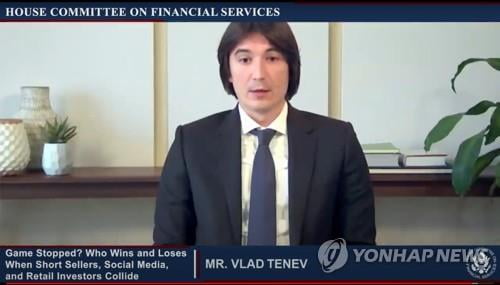Focusing on transaction restrictions… Teneb CEO “Apologizes to Customers”, denies support for hedge funds

The US House of Representatives hearing was held on the 18th (local time) on the game stop incident, which is called the US version of the’rebellion of ants (individual investors)’.
The U.S. House Financial Services Commission held a video hearing on the day and called out Brad Teneb, CEO of Robin Hood, a free stock app at the center of criticism, to investigate the actions taken by the company during the crisis.
Robin Hood’s stock prices surged last week in some stocks, such as GameStop, leaving institutional investors unchanged and restricting individual investors from trading the stocks.
According to the Washington Post (WP), Teneb bowed at the hearing, saying, “What happened this time is unacceptable,” and “apologizing to members and customers.”
It officially apologized for the transaction restrictions.
“We are doing everything we can to make sure this doesn’t happen again,” he said.
In the meantime, individual investors grouped around the online community Reddit’s’Wall Street Betz’ have been protesting against hedge funds’ short selling of certain stocks such as gamestops, buying the stock and raising the price.
When some hedge funds suffered a huge loss, suspicion was raised that Robin Hood helped hedge funds by restricting transactions.
However, Teneb denied this, saying, “We do not respond to hedge funds (requests).”
He explained that the transaction restrictions were due to the need to cope with the surge in stock margins, which had to be deposited with the financial authorities due to the volatility of some stock prices.
He said that the company has taken steps to prevent recurrence, such as increasing liquidity to 3 billion dollars (about 3 trillion won) to prepare for increased margins and market pressure.
However, he avoided an immediate answer to Maxine Waters’ question about whether Robin Hood suffered a liquidity crisis on the 28th of last month.
At the time, he said there was no such problem.

Democrat Carolyn Maloney pointed out that Robin Hood did not notify customers in advance about the requirement to maintain reserves, nor did he specifically disclose to customers how they could restrict transactions.
“You seem to have the right to make those rules,” said Maloney.
Robin Hood was fined $65 million (approximately 71.1 billion won) for failing to provide the best stock trading as promised to investors in December last year.
“I’m not going to say that regulatory compliance is central to everything we do,” Teneb said. “I won’t say that Robin Hood did everything perfectly and made no mistakes.
I will improve and learn from this work so I will not make the same mistake.”
Democratic Party Congressman E-Manual Clever condemned the case of Alix Kerns, 20, who made an extreme choice because he misunderstood that he lost a large sum of money after investing with Robin Hood.
In June of last year, Kerns traded put options (the right to sell certain assets at a certain point in time) with the Robin Hood app, and found that a negative balance of $730,000 (about 820 million won) was stamped.
Not knowing that he could get it back if he exercised the put option, he had to make an irreversible choice after failing to contact Robin Hood’s customer center every time.
The bereaved family recently filed a lawsuit in the court, claiming that Robin Hood did not properly guide the investment-related information and that the customer response was insufficient.
Teneb expressed regret to the bereaved and said, “It was very painful.
“We have committed to a series of positive actions to make our optional products safer for our customers.”
He explained that shortly after the incident, there were some improvements, including the ability to immediately exercise options in the Robin Hood app, adding real-time phone-based customer support, and clearly displaying app users’ purchasing power.
On this day, the stock price of GameStop in the New York Stock Exchange was $40.69, down 11% from the previous trading day.
/yunhap news
